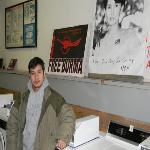June 08, 2011

Photo: VOA - D. Robison
Zah Win in his Buffalo, New York, laundromat where the walls are covered with posters denouncing Burma’s military junta.
Zaw Win's journey from Burma to Buffalo, New York was not a matter of just buying an airline ticket.
He spent five years as a political prisoner in his native country where Win says he was tortured and starved. Escaping after paying smugglers to hide him in the bottom of a fishing boat, he eventually made it to the United States where he was granted asylum. In 2005, he was resettled in Buffalo.
Now, Win runs a laundromat where the walls are plastered with colorful posters denouncing Burma's military junta.
"Whenever I put the sign, the customer they ask me question and they can explain current situation in my country," he says. "Where is location of Burma? What happening in Burma now? Who is the leader now? What is the military dictatorship?"
Thousands of Buffalo residents already know the answers. Like Win, they fled from Burma. And they also landed in America's third poorest city unable to speak English with almost no money or job prospects. But some long-time residents see investing in these refugees as Buffalo's way forward.
"What we feel like we're doing is just giving people a little leg up on prosperity and we've seen people take hold of that and blossom with it," says Bonnie Smith. "Slowly the community begins to improve."
Working through her church, the retired businesswoman helped Win develop a business plan and provided collateral for him to get a microloan. It's something he never would have qualified for on his own. In the past decade, close to 10 nonprofits in Buffalo have started or added refugee resettlement to their mission. That can include English classes, driving lessons or help buying and improving one of the economically-depressed region's thousands of abandoned homes.
Cities along the Great Lakes used to rule the American economy, manufacturing steel by the shipload. Now, these once mighty metros are known as the Rust Belt. Since the aging industrial plants in Buffalo started closing in the 1950s, more half of its population has left. But now, thousands are moving in: refugees from Burma, Sudan and other far-away, conflicted places. Officials are trying to turn their relocation into a renaissance.
According to Aaron Bartley, director of PUSH Buffalo, refugees are perfect candidates to bring Rust Belt cities back to life. "The way we're going to solve that is by making it a neighborhood people want to stay in. And a neighborhood the various communities - whether they're Burmese, Somalian, Sudanese, Liberian - want to put down roots in. That they don't see it as a stopping point to get to another place."
This wouldn't be happening on such a large scale without the Refugee Protection Act of 1980. The law was designed to stop population loss in Rust Belt cities like Buffalo, Detroit and Cleveland by subsidizing refugee resettlement there. About 1,500 refugees came to Buffalo just last year.
"Even with that 1,500 refugees, we still saw a population decline in our community. We're still trying to catch up even with those refugees coming in," says Molly Short, who runs Journey's End, one of Buffalo's four resettlement agencies.
While most American cities have one agency like hers, the Rust Belt is home to dozens and Short says they can barely meet the demand. She adds that services like hers have been severely hurt by federal budget cuts in recent years. Often times, the agencies can't predict what help a refugee needs to feel at home.
"Sometimes we'll have a refugee arrive who has literally never been in a car before they left a refugee camp, never used electricity and then we have refugees come in who are doctors and scientists and mathematicians."
And many times, the educated and illiterate are competing for the same small pot of jobs.
While Burmese refugee Win feels quite welcome in Buffalo, some customers can be difficult and Win feels business could be better.
"Not really bad, not really good. So-so. Not much money for my pocket. And then for future more and more better, I believe this."
Win says his microloan will be paid off in a year or two. Then, he plans to assist others just as he was aided - helping out-of-work refugees open their own shops and create their own jobs.